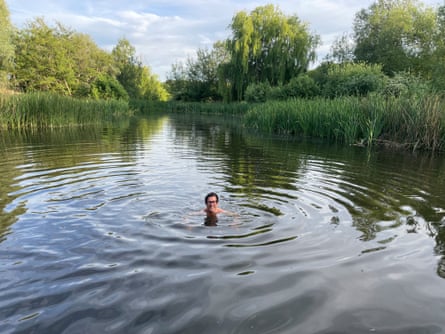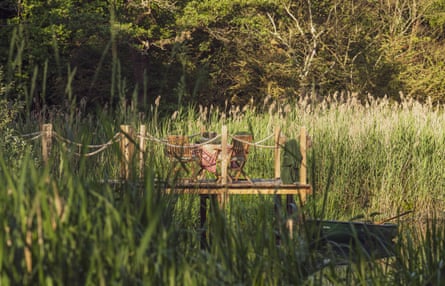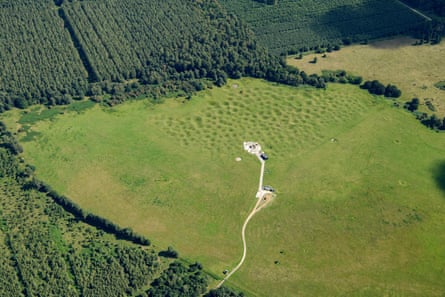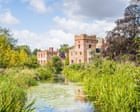Exploring the Enigmatic Breckland: A hidden Gem in Norfolk
Scattered across the landscape, small white signs with bold red letters proclaim, “Military training area – no entry.” These warnings contribute to the unsettling atmosphere of quiet roads and gnarled Scots pines that embrace the lingering summer twilight.
Upon reaching our lodging at a historic farm adjacent to this restricted zone where British forces conduct covert operations, we are enveloped in tranquility. A red kite dances gracefully on the breeze above picturesque parklands, while a cuckoo calls out nearby. Alongside the crystal-clear Wissey chalk stream, reed warblers chatter from within dense rushes.
The Unique Charm of Breckland
Breckland is a region that truly deserves its own recognition as a distinct county. This remarkable area straddles south Norfolk and north Suffolk and is characterized by sandy heathlands. its climate is unusually arid for England, resembling that of central Europe, making it home to an array of rare flora and fauna. Historically dominated by inland sand dunes and rabbit warrens, much of Breckland has been transformed as the 20th century into coniferous forests like Thetford Forest. While these woods offer numerous walking trails, they also encompass vast military training grounds spanning 30,000 acres where public access is prohibited—allowing wildlife to flourish undisturbed.
A Sanctuary for Endangered Species
This region serves as a refuge for captivating endangered birds such as the stone-curlew with its striking eyes, agile goshawks inhabiting forested areas, and elusive nightjars that come alive after dark. Additionally,it hosts incredibly rare plants and insects with whimsical names—from prostrate perennial knawel to wormwood moonshiner beetles—making it one of EnglandS most protected environments; if not for military claims on much land hereabouts,it would likely be designated as a national park.
A Hidden Treasure Off The Beaten Path
Ofen overlooked by travelers rushing towards coastal destinations or Norwich city life due to its lack of charming towns or upscale dining options (though Bury St Edmunds at its southern edge boasts Michelin-starred Pea Porridge), I had never thought to bring my family here until now despite living just 30 miles away.

My children quickly fall in love with Bodney Hall Farm where we stay in an exquisitely refurbished cottage—the smaller option among two luxurious self-catering accommodations available. Guests have access to sprawling 40-acre grounds leading down to River Wissey featuring an enchanting blend of diverse trees alongside formal gardens filled with wildflowers teeming with wildlife.
We wander along this private stretch beside Wissey River which has been lovingly restored by owners Henry and anna Sands as their move from London in 2016; they’ve revitalized natural meanders while enhancing water clarity over shingle beds—creating habitats for lively inhabitants like wild trout and kingfishers alike.
A Refreshing Retreat
The river invites swimming opportunities but also features a jetty providing easy access into an expansive pond fed by Wissey surrounded by reeds and willows—a perfect spot for evening swims accompanied by sounds from cuckoos overhead along with reed warblers’ melodies—and astonishingly even booming bittern calls! the water feels refreshing akin to Scandinavian lakes while we unwind later in our private wood-fired hot tub under emerging stars; I half-expect some distant military activity but all remains serene around us.

I rise early one morning around 5:45 AM eager for another swim only narrowly missing spotting an otter (Henry saw it!). Afterward comes time spent soaking again before heading off toward Grime’s Graves—the largest known flint mine site within Britain dating back over four millennia ago when Neolithic people excavated up-to-1000 shafts reaching depths up-to-13 meters using antler picks extracting high-quality flint used throughout ancient tool-making processes across regions far beyond their origin point!
An Insightful Journey Through History
This historical site presents itself through grassy clearings dotted about strange mounds marking old mineshafts long since filled-in—all accompanied melodiously via skylarks singing overhead! the English Heritage visitor center maintains low-key charm allowing tactile experiences through “please touch” signage inviting visitors feel weightiness associated flints alongside sharp edges found upon knapped stones themselves! My kids delight wielding replica axes before moving onto highlight descending nine-meter deep mineshaft unearthed during archeological digs back-in-time circa1914 revealing remnants including antler picks pottery animal bones even neolithic bats still roosting today amidst constant cool temperatures maintained below ground level!

“It smells nice down here,” remarks my son Ted upon entering cool dampness surrounding us inside these tunnels—a vivid experience transporting us back through time itself! Our day continues exploring more darkened spaces next visiting Oxburgh Hall—a stately residence featuring priest holes reminiscent childhood tales evoking Tudor-era fears! On route there we stop briefly Foulden Common—one among manny tranquil yet rare nature reserves scattered throughout including Weeting Heath Lakenheath Fen boasting rich biodiversity worth discovering further afield too!
A Glimpse Into Tudor History
Oxburgh stands proudly adorned red-brick architecture encircled beautifully moat surely ranking amongst most picturesque National Trust properties existing today built originally Sir edmund Bedingfeld circa1476 still inhabited partially descendants residing wing open public showcasing vast oil portraits ornate furnishings ancient tomes leather wallpaper acquired secondhand Spain thrifty Victorian aristocrats once lived lavishly past centuries gone-by!
